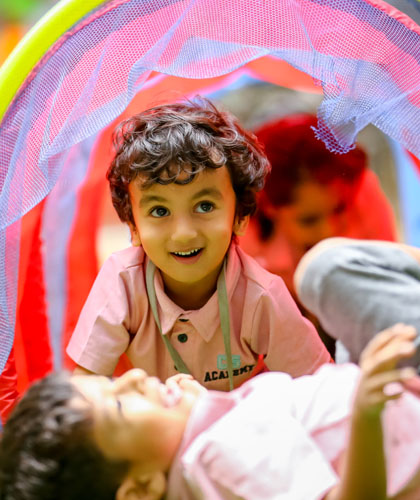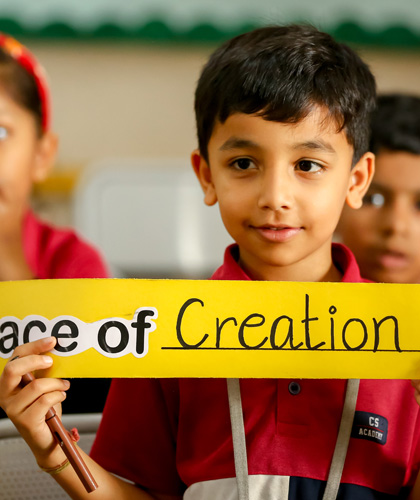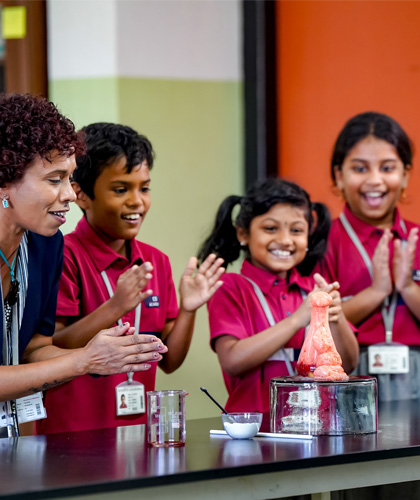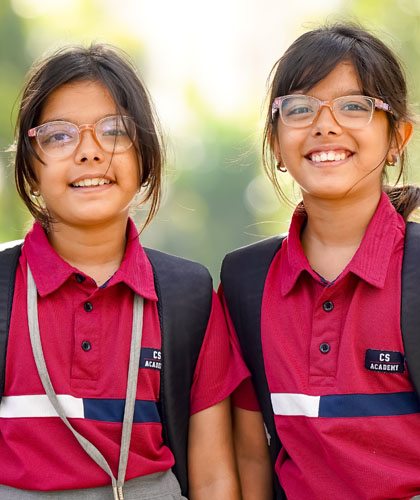The Central Board of Secondary Education (CBSE) is the most popular board in India
The CBSE follows the National Curriculum Framework which is the basis for all entrance examinations to universities in India. The focus of the CBSE recently has shifted towards more conceptual understanding and application of concepts learned.
Kindergarten at CS is fun combined with a focus on learning new skills
The KG years are the listening and talking years at CS. While children have fun coming to school, they also are challenged to learn new skills. A variety of methodologies drawn from different disciplines including phonics, play way and Montessori are used to ensure children are motivated to learn. Small class sizes of around 20 students and support from assistant teachers for every class, ensures personal attention for every student.

PKG
- PKG is the first year of formal entry into CS Academy.
- The focus is on learning to socialize with peers and become independent.
- The child can observe and assimilate a huge volume of stimuli at this age and needs to be nourished.
- Our program combines structured play time with developing language skills, peer interaction and building confidence.
- The typical Pre KG classroom has 20-22 children with a teacher and an assistant teacher.

LKG & UKG
- LKG is the listening and talking year at CS. The main focus is on developing essential language skills of listening and speaking.
- Our phonics program and accelerated English program helps develop English language skills with a solid foundation.
- We do not expect children to start writing at the beginning of KG.
- UKG is when our kids graduate to writing and a higher order of complexity in activities.
- Field trips, study trips, outdoor play and dedicated activity rooms to help children develop gross and fine motor skills are all a part of the KG program.

Levels I to III
- The focus is on learning through experiments and activities.
- Story telling workshops and dedicated book reading programmes inculcate regular reading habits.
- A wide range of co-curricular activities are integrated into the schedule and all activities are compulsory.
- Children participate regularly in competitions.

Levels IV and V
- The focus is on learning through experiments, activities, debate and teamwork.
- Students have greater choice of co-curricular activities and club activities.
- Students are placed in one of 4 houses – Prithvi, Agni, Vayu or Akash.
- Students can elect to participate in the After School Sports (AFS) program.
- Class IV is when students move to the system of formal examinations.
- One day a month is dedicated for competitions.

Levels VI to VIII
- The curriculum becomes more challenging with the requirement to learn more abstract concepts.
- Multi-media in the form of videos & presentations are used more often.
- Learning Management Systems are used more often with online exercises.
- Students are free to select from a range of co-curricular activities and clubs based on their area of interest.
- French and Spoken Hindi are available for optional learning.
- Students interact more with the external world and form opinions.

Levels IX to XII
- Students start preparing for their entry into university.
- Career counseling programme starts from grade IX
- Allocation of groups is dependent on performance in grade X, an assessment test and an interview.
- Dedicated laboratory facilities for Computer Science, Physics, Chemistry, Mathematics and Biology are provided.
- Integrated competitive exam coaching for all major entrance examinations.
- Students take leadership positions.
- Students select from a wide range of subject options including English, Mathematics, Physics, Chemistry, Biology, Computer Science, Accountancy, Commerce, Business Studies, Entrepreneurship and Psychology.

